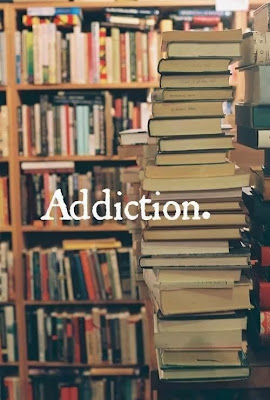I've heard the term, "book hangover" before, but I didn't realize just how much a good book is like alcohol until after I turned 21.
Think about it:
- Drinking puts your mind all out of whack, just like when you're in the middle of a good book, and nothing you say makes sense because all you can talk about is the story.
- At a family party, if you're drinking, you're probably doing it to isolate yourself from all of your relatives. I did the same thing with my books, when I would read at family gatherings.
- When you're reading too many books at once, you get easily lost and confused about who is who, which character belongs with which backstory, and where-the-heck-are-we-going?
- When you wake up the next day after finishing a particularly thrilling and involved novel, the wake of that story leaves you dazed and probably more than a little sad. And you probably have a headache from staying up so late to finish, and you don't really want to do much of anything but eat your feelings for that character you liked that died at the end.
- You tell yourself "I'm never doing that again" when you wake up this way, but in no time at all, you're back on that wagon.
I have found that there are really only two ways to combat and prevent a book hangover:
- To not read.
- To start about fifteen-thirty pages of a new book just before you finish the last one.
 For me, option 1 is not a possibility, and it probably won't ever be. I don't want to be book sober, and I hope I never will be.
For me, option 1 is not a possibility, and it probably won't ever be. I don't want to be book sober, and I hope I never will be.
Option two is one of my own making. I have determined that, by just-barely starting a new book in the last fifty pages of the one I'm about to finish, I can "keep the buzz" going when that first book ends in a blaze of glory. Instead of moping around and getting "hung-up" on that last book, I've already got something to look forward to, because I've read just enough of the new book to know who the protagonist is and what kind of trouble he/she is facing.
It's not a perfect strategy, but it works for me. If I wasn't constantly reading two or three books, I'd probably never have gotten over [SPOILER] Dumbledore's death [SPOILER] or, more recently, the end to the Divergent trilogy.
It's hard, ending something you've spent 150-700 pages working on. It's hard to let those characters go, but we have to accept that story has to come to an end. In some series, we learn the hard way that they maybe should have ended sooner than they did, but whatever. I've come to realize that overly empathetic readers like myself need to have multiple things to focus our thoughts and emotions on, or else we'll put our whole beings into the stories we have in front of us, and a part of us dies with the end of the book.
I'm not saying feeling strong emotions for books is wrong, but it isn't right to let it control you. It is fiction, it is not real, and we must learn to let go. I personally move on faster when I have something new to hang onto, like a new project, craft, or book.
This is not a step-by-step program to rehabilitate your addiction. It is to nourish it, and help you get addicted to great books, so when you do consume your "poison," it's not crap.
I am NOT by any means saying that alcohol and reading are the same thing, or that they are the same kind of addictions.
In fact, I encourage you to nurture your addiction to books.
